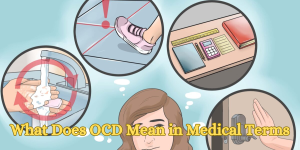What Does OCD Mean in Medical Terms
Obsessive-Compulsive Disorder (OCD) is a psychiatric condition characterized by persistent, intrusive thoughts (obsessions) and repetitive behaviors or mental acts (compulsions). Understanding what OCD means in medical terms involves delving into its diagnostic criteria, symptoms, and the impact on individuals’ lives.
Defining OCD: Medical Insights
OCD in Diagnostic Terms
The medical definition of OCD is rooted in the Diagnostic and Statistical Manual of Mental Disorders (DSM-5). Explore the criteria that mental health professionals use to identify and diagnose OCD, shedding light on the nuances of this complex disorder.
Unraveling Obsessions and Compulsions
Dive into the two core components of OCD: obsessions and compulsions. Discover the nature of intrusive thoughts and the repetitive actions or rituals that individuals with OCD engage in to alleviate anxiety. Understanding these aspects is crucial for both patients and caregivers.
OCD Symptoms and Impact
Recognizing OCD Symptoms
Explore the diverse range of symptoms that manifest in individuals with OCD. Medical From repetitive handwashing to intrusive thoughts, gaining insight into the various ways OCD can manifest aids in early recognition and intervention.
Impact on Daily Life
Delve into the profound impact of OCD on daily life, relationships, and overall well-being. Understanding the challenges individuals face empowers both patients and those around them to provide support and seek appropriate treatment.

Coping and Treatment Options
Coping Strategies for OCD
Highlight effective coping strategies for managing OCD symptoms. From mindfulness techniques to therapy approaches, empowering individuals with tools to navigate their condition is essential for fostering resilience.
Medical and Therapeutic Interventions
Examine the array of treatment options available for OCD, ranging from medication to psychotherapy. Providing a comprehensive overview helps individuals make informed decisions about their care.
OCD Medication
OCD medication plays a pivotal role in managing symptoms, commonly relying on SSRIs and SNRIs. These medications work by influencing neurotransmitters, alleviating anxiety and obsessive thoughts. While effective for many, OCD Medication the response varies, and some individuals may experience side effects. Regular monitoring and adjustments are crucial, emphasizing the importance of medical supervision.
Obsessive–Compulsive Disorder Medication
Obsessive–Compulsive Disorder Medication, primarily SSRIs and SNRIs, targets neurotransmitter imbalances associated with OCD. Obsessive–Compulsive Disorder Medication These medications can significantly reduce the intensity and frequency of obsessive thoughts and compulsive behaviors. However, it’s essential to acknowledge potential side effects and the need for an individualized approach. Collaborative discussions with healthcare professionals ensure a balanced treatment plan that considers both medication benefits and potential drawbacks.





